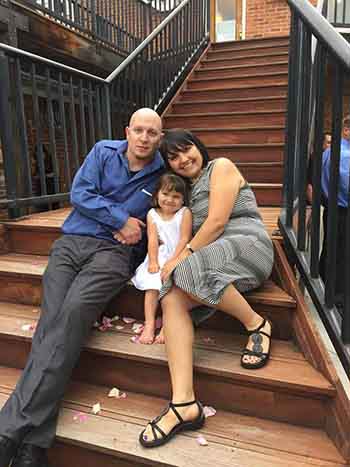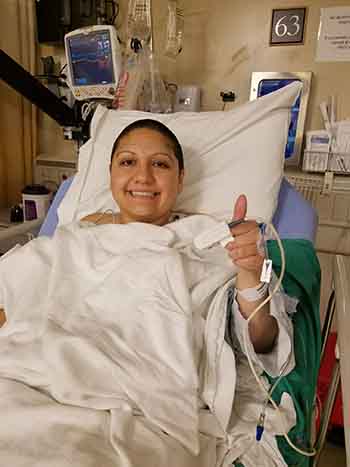Neurosurgeon: Aviva Abosch, MD, PhD, FAANS
Condition: Focal epilepsy with grand mal/tonic clonic seizures and absence seizures.

The typical 16-year-old is looking forward to getting a driver’s license, applying to college and going to the next high school party. For Denise Garcia, she was looking for answers as to why she would wake up in the morning with a sore tongue. The culprit? Absence seizures. Upon seeing a neurologist, Denise was diagnosed with focal epilepsy.
After learning about her condition, Denise learned another important lesson: a diagnosis is one thing, but finding the right medical professionals and effective treatment is another. Denise has visited her fair share of neurologists. “I had to just realize things were not getting better and look for someone else,” she says of her experience. Fortunately, her hometown, Denver, provides viable options for medical care. After a vagus nerve stimulation (VNS) recommendation and treatments that did not help her condition, Denise was referred to an epilepsy specialist, Cornelia Drees, MD, at UCHealth. “The treatment I received from them changed my life,” Denise says.
In January 2018, Denise was treated with hippocampus laser ablation by neurosurgeon Aviva Abosch, MD, PhD, FAANS. “I feel the best I have felt in years!” Denise exclaims. About six months after the surgery, she has gone from 3-5 absence seizures a week to one. This has not been without side effects. She has lost some vision, but can still perform normal activities. Denise has also experienced minor memory loss, but it has not gotten in the way of her every-day life and responsibilities. For patients living with a condition like epilepsy, life’s possibilities can seem more limited. Happily, Denise has been able to reach monumental personal goals.
Denise is a dedicated mother and has a fulfilling career. She has been with her husband, Jeremy, for 19 years and they have five-year-old daughter, Gabby. Introducing her future husband to epilepsy was challenging, according to Denise, “The first seizure he witnessed was heartbreaking for him and even more so for me. When I came out of it, he was holding me, wiping the blood and saliva from my mouth and crying. He did not know what to do.” Jeremy is now comfortable with knowing what to do if Denise has a seizure and has helped teach their daughter how to handle such situations. For Denise and Jeremy, epilepsy and the medication that goes with it were a special consideration when deciding to have a child. Fortunately, they were blessed with Gabby, who is a happy and healthy child.
Denise has been a dental assistant for an endodontic practice. She disclosed her condition during the job interview process not knowing what to expect and has now worked at the same office for 18 years. Denise was lucky enough to find a workplace that maintains awareness of her epilepsy and teaches her coworkers what to do to help when a seizure happens. Patients rarely notice when Denise is having a seizure, so having educated coworkers helps her to get assistance when she needs it. The support she finds at her job and the fulfillment she gains from working with patients has helped Denise find a successful career.
Denise continues to manage her condition by taking her medication as instructed and following a ketogenic diet. Denise maintains an optimistic view of the future:
“I will always be fighting epilepsy. I know that, and it’s okay, because I have made friends who fight the same thing. I realize there are others who are fighting something much worse than epilepsy. I am so blessed to have met people like Dr. Drees and Dr. Abosch and other doctors who dedicate their time so people like me can improve and feel better.”
With no family history of epilepsy, Denise and her family were forced to discover the implications of her diagnosis with no familiar reference point. Denise did face some stigma in high school, but it mostly consisted of teachers and students uncomfortable with the idea of unpredictable seizures and not knowing what to do when they occur. This served to teach Denise that educating others about her condition is important. She has found a supportive community of individuals to whom she can relate. Epilepsy groups, like those found on Facebook, have provided her with an opportunity to find strength and comfort in knowing there are others in her position.

Feeling connected to others who have life experiences similar to her own and having found doctors who she can trust has made a tremendous impact on Denise’s life. She shares her story comfortably and confidently to teach others about epilepsy as well as the importance of finding the right treatment and a medical professional that fits one’s needs. Events, such as AANS’ Neurosurgical Awareness Month, help build awareness of what epilepsy is and patients like Denise prove that epilepsy is not the end and that with the right support, patients will persevere.
Note from AANS
The AANS does not endorse any treatments, procedures, products or physicians referenced in these patient fact sheets. This information is provided as an educational service and is not intended to serve as medical advice. Anyone seeking specific neurosurgical advice or assistance should consult his or her neurosurgeon, or locate one in your area through the AANS’ Find a Board-certified Neurosurgeon online tool.
